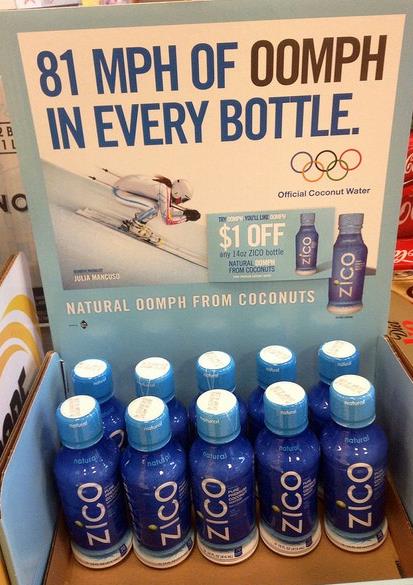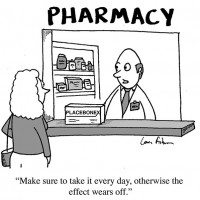
Ski faster with coconut water?
I don’t tend to worry too much about hydration, except when I exercise. I’ve been running regularly for over 15 years, and since I started I’ve usually carried water, or for longer runs, I drink old-school Gatorade. The formulation is basic: sugar, salt, and potassium. There are hundreds of electrolyte products marketed for athletics, but I’ve been faithful to the original: It’s cheap, I don’t mind the taste (even when it’s warm), you can buy it nearly anywhere, and it’s the usual liquid (besides water) offered at races. After exercise, I rehydrate with plain water, preferring to get my electrolytes and carbohydrates from food, rather than a specialty beverage, some of which are “designed” to support rehydration after exercise. The science of sports and hydration is constantly evolving, and so is the marketing. I’m apparently an outlier by still running with Gatorade. New hydration products criticize Gatorade for being artificial and inferior, arguing that natural sources of hydration are better. There’s been an explosion of rehydration beverages, marketed both for everyday hydration and sport purposes. Coconut water was the first natural product to find fairly wide popularity as a sports-oriented beverage. Now you can find maple water, cactus water, watermelon juice and even artichoke water. Is “natural” hydration better that substitutes, including plain old water?
The science of hydration
The science of hydration, particularly during exercise, has come a long way since I started running in the nineties. When I took my first “how to run” clinic, there were a few mantras that reflected the prevailing wisdom: Dehydration is the enemy. Dehydration impairs performance. Dehydration can occur without you even noticing, so don’t trust thirst. Start hydrating before you become thirsty. Drink at every water station during a race.
These seem to still be generally accepted as truths, judging by the ubiquity of water bottles that we now lug everywhere. Hydration is an obsession, and not just when we exercise. We’re advised to drink a specific number of glasses of water per day, to counter hidden dehydration and flush out the toxins. Our hydration options have expanded too. Today you can buy water with added vitamins (and sugar) and popsicles “with added electrolytes”.
The most current science seems to suggest, perhaps unsurprisingly, that we may be taking our obsession with hydration a bit too far. Alex Hutchinson is my go-to source of knowledge on sport science (buy his book; I did) and he writes regularly on hydration and exercise. My own understanding on the current science of hydration in sports has changed, informed in part by scientists like Alex. Like many other fields, the evidence keeps emerging, but the current science-based approach seems to be as follows:
- “Drink according to your thirst” seems to be the most practical approach to hydration. You don’t need to hydrate if you’re not thirsty. This advice is relevant to both day-to-day activities as well as athletics. There is no need to drink a specific amount of water per day, nor is there a requirement to drink constantly while you exercise.
- Mild dehydration doesn’t appear to impair performance in endurance athletes.
- Overhydration in sports, particularly in slower long-distance runners that may ignore the above, is a real risk. Overhydration combined with exercise can lead to hyponatremia (low sodium), which can be a serious medical issue.
- In general, sugary beverages provide calories but not satiety, so they should be consumed in moderation. In most cases, water is probably the perfect beverage for hydration, exercise or otherwise.
- For long-duration endurance sports, some carbohydrate (like sugar) may be helpful. While some electrolytes may be helpful, you don’t need your hydration beverage to contain vitamins. You generally don’t need to worry about carbohydrates and electrolytes during a soccer game or similar short sporting events.
When it comes to athletics, there’s a lot of interesting science that continues to challenge what we think we know about hydration. Researchers continue to explore the differences between thirst sensations, dehydration, and performance. Expectations about hydration, and thirst, may influence performance more than ones hydration status itself.
Is there such thing as magic water?
Given the current evidence, is there anything to suggest that any liquid has an advantage over another when used strictly for hydration? One way this has been examined is in treatment of dehydration, particularly diarrhea. In most cases, mild diarrhea is a bother. Severe, sustained diarrhea, however, particularly in children, can become life threatening without treatment. Diarrhea kills millions in the third world each year, mainly children under the age of 5. The treatment is simple, but not always available. The World Health Organization’s Oral Rehydration Solution (ORS), which is 6 level teaspoons of sugar and 1/2 level teaspoon of salt dissolved in 1 litre of water, is considered the optimal ratio of sugar and salt to support rehydration. Why sugar and salt in the water? It’s because plain water is not absorbed as well as a solution of salt and sugar. The concentration of sugar and sodium will impact on how effectively a beverage will hydrate. But does this matter in an athletic context?
You’re using coconuts!
From the grocery store to the yoga studio to the running club, coconut water is everywhere. There’s even a new beer (Sleeman Lift) that is brewed with coconut water and is labeled for the “performance focused”. Coconut water is positioned as a superior product for rehydration. The marketing and packaging rely heavily on the appeal to nature (like the photo above):
- Coconut water naturally contains sugars and electrolytes.
- Natural is better than unnatural.
- Therefore coconut water is a better beverage choice.
Or is it?
Don’t confuse coconut water with coconut milk, which contains a lot of coconut “meat”, the white solid we might refer to simply as coconut. Coconut water is the 2-4 cups of fluid inside a young coconut, which declines as the “meat” grows. Depending on when the water is withdrawn, the electrolyte levels may vary, but have been reported in the following ranges [PDF]:
- sodium 0.7-0.9 mEq/L
- potassium 35-82 mEq/L
- glucose 1.2-2.8 grams/L
- calcium 5-17 mEq/L
- magnesium 5-25 mEq/L
There are also small amounts of amino acids, vitamins and minerals present. Compared to a typical sports beverage like Gatorade, there’s more potassium, and less sodium and sugar. It also has no artificial colours or flavours. And unlike Gatorade, coconut water has even been directly injected into veins. Coconut water appears to be inferior for dehydration caused by diarrhea compared to solutions like the ORS. For exercise-induced dehydration, I found three relevant studies:
- Coconut water was compared to a carbohydrate/electrolyte beverage, and plain water, in subjects who exercised in the heat. After exercise subjects drank 120% of their fluid loss. There was no significant difference in the amount of hydration achieved, electrolyte levels, or fluid balance.
- Another study compared plain water, sports drink, coconut water, and sodium-enriched coconut water. Again, subjects exercised in the heat and then rehydrated with 120% of their fluid losses. Here, sports drink and both coconut waters rehydrated to a similar extent and all were slightly superior to water. The sodium-enriched coconut water was reported as better tolerated than other beverages.
- In another study, coconut water was compared with sports drink and plain water, following exercise-induced dehydration. No significant differences were noted between groups.
So what’s best?
In most cases, you don’t need to over-think your hydration. Drink if you’re thirsty. Water is best in most circumstances. There’s no convincing evidence to suggest that coconut water is a superior beverage for hydration. Coconut water has no magical properties which will make you ski faster. Having said that, many love the taste of coconut water. As a low calorie option, it may be preferred by some over carbohydrate-containing sports drinks. Or you can stick with zero-calorie water, and rely on your food for carbohydrates and to replenish electrolytes.
Photo from flickr user Mike Mozart used under a CC licence.

